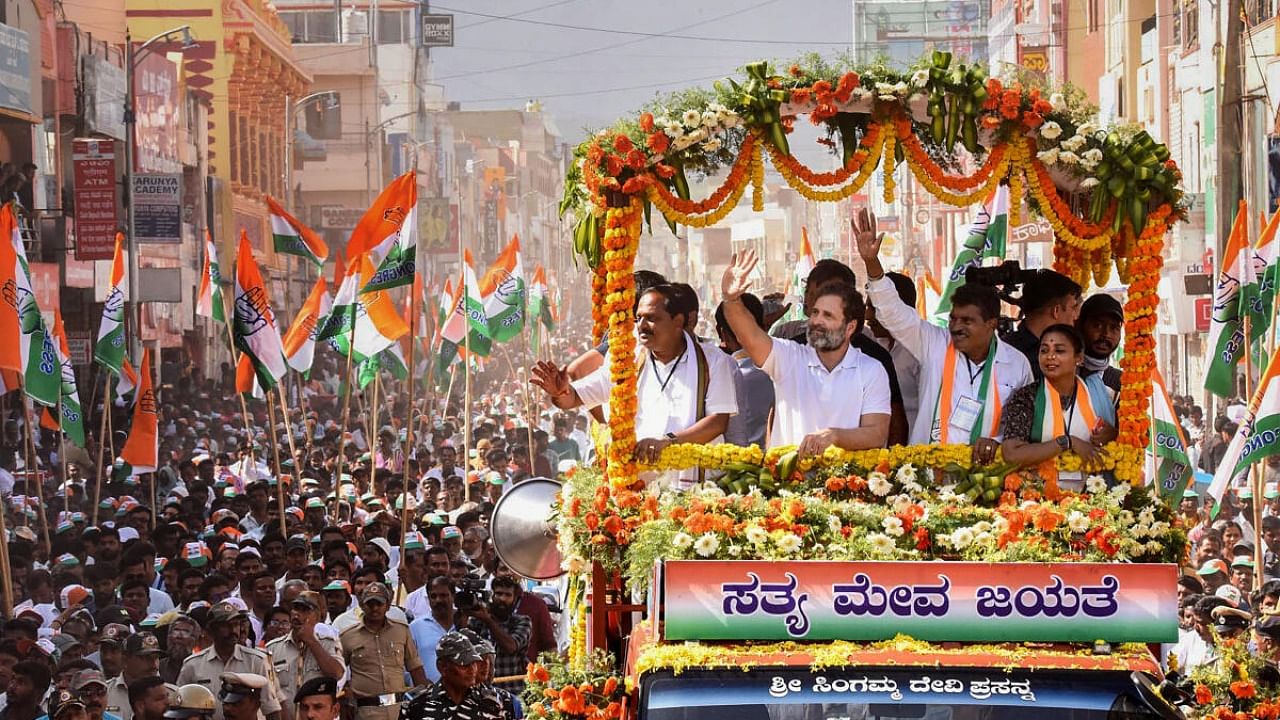
After many years, Karnataka was one state where from the beginning of the electoral campaign it was clear that the Bharatiya Janata Party (BJP)’s pitch for a ‘double engine sarkar’ was not resonating with the electorate. Yet, many liberal intellectuals and journalists were not reporting what they were seeing on the field. They predicted a hung assembly, or that the BJP would emerge the single-largest party in the House — in private, many confessed that the Congress was the frontrunner. Perhaps they were blinded or terrorised by the Right-wing propaganda machinery.
Since 2013, the BJP’s incessant propaganda inflated to grandeur proportion many myths: first, was that Prime Minister Narendra Modi had the Midas touch to turn the fortunes of any election in the BJP’s favour; two, was that any criticism of Modi ultimately helped him electorally, and; third, was that it was disastrous for any political party to go against the sentiments of the majority community.
In Karnataka, many liberals believed that: a last-minute push by the Prime Minister had decidedly turned the table in the BJP’s favour; the Congress shot itself in the foot by saying that the Bajrang Dal would be banned; chanting ‘Bajrang Bali’ was a masterstroke, and; Kharge did the Congress a great disservice by calling Modi a “venomous snake”. Thankfully, the voters of Karnataka proved much smarter.
This ‘Modi-phobia’ has blinded intellectuals so much that their analysis of the Congress is mostly sprinkled with defeatism, ridicule, and contempt. This blindness led them to believe that the Congress could not be revived. What they failed to realise was that over the last few months a new Congress was emerging. It is too early to say if this resurgence is at the national level, but it is visible at the state level — and Congress leader Rahul Gandhi should be given the credit for it.
Gandhi was among the early politicians in India who believed that Modi becoming Prime Minister was no periodic change of government between two political parties, but was the beginning of an ideological rerouting of India’s secular compass. This ideological state has consolidated itself over the last few years, and today it is more entrenched than one can imagine. According to Gandhi, to counter Modi, the ideology that he represents needs to be defeated, and that Modi is the external expression of the Rashtriya Swayamsevak Sangh (RSS); and Modi can only be defeated by discrediting the RSS’ Hindutva. Hindutva is not Hindu dharma, and the RSS’ Hindutva is a political ideology which uses the Hindu dharma and its symbols, it’s culture, and traditions to gain power.
Gandhi’s Bharat Jodo Yatra (BJY) was not a political journey, but an ideological pilgrimage to connect with the people, to educate the masses about the dangers of the RSS’ ideology, and awaken a sense that this fight would not be an easy one — people have to be ready for a long haul, and for a lot of sacrifices as historically an ideological State doesn’t retreat easily.
To the surprise of many, Gandhi’s message during the yatra and the new strategy has seen its results in Karnataka. The Congress did not budge from its pitch of multiculturalism, peaceful coexistence of religions, respect for diversity, and engagement with local culture and the identity. When the BJP announced the removal of 4 percent reservation for the Muslims to redistribute among the Hindus, the Congress boldly said it would bring it back once in power. A pre-BJY Congress would not have taken such a bold stand fearing that it would antagonise the Hindu voters to the BJP’s advantage. The election results show that the Hindus overwhelmingly rejected the BJP.
Yet again the Congress was bold when it announced that if elected to power it would ban the Bajrang Dal. The BJP tried to make Bajrang Bali a national issue. It was termed an insult to Hindu symbols and deity. A few old-school Congress leaders looked shaken, but the leadership did not flinch. It’s engagement with the local culture convinced them that it was Veer Anjaneya who was worshiped in every corner of the state, but Bajrang Bali was not an election issue. The grand old party managed to keep the focus on the performance of the Basavaraj Bommai-led BJP government.
It is Gandhi who endorsed caste-based census in Kolar. The Congress was uniquely placed in Karnataka with its three tall leaders representing the rainbow coalition of the backward castes. Siddaramaiah is a Kuruba, Mallikarjun Kharge a Dalit, and D K Shivakumar a Vokkaligga.
In its search for a new social base, the Congress has been trying to build a social justice narrative for the party. The appointment of Kharge as the party President and earlier appointing Charanjit Channi (a Dalit) as the Chief Minister of Punjab, is aimed at winning the confidence of the Dalit community. If Siddaramaiah becomes the Chief Minister of Karnataka, the Congress will have three OBC leaders as chief ministers (the other two are Ashok Gehlot and Bhupesh Baghel).
Unlike the over-centralisation of the BJP, the Congress decentralised its election campaign, reposed faith in state leaders, national leaders acted as mentors but refused to impose themselves. A similar formula was adopted successfully in Himachal Pradesh.
Karnataka has only confirmed that the Congress has the willingness to shed its past, it is trying to get out of the old mindset, and is ready to experiment with new ideas. Still, it is too early to predict how soon it will crystallise into a winning model at the national level. However, one thing is sure, it now has clarity about its future path.
(Ashutosh is Editor, Satyahindi, and author of Hindu Rashtra.)
Disclaimer: The views expressed above are the author's own. They do not necessarily reflect the views of DH.